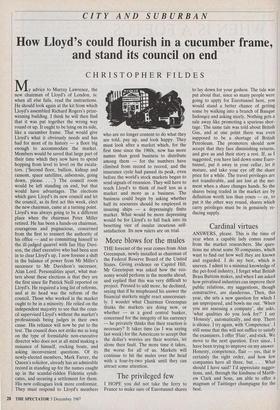CITY AND SUBURBAN
How Lloyd's could flourish in a cucumber frame, and stand its council on end
CHRISTOPHER FILD ES
y advice to Murray Lawrence, the M new chairman of Lloyd's of London, is: when all else fails, read the instructions. He should look again at the kit from which Lloyd's assembled Richard Rogers's prize- winning building. I think he will then find that it was put together the wrong way round or up. It ought to be lying on its side, like a cucumber frame. That would give Lloyd's what it obviously needs and has had for most of its history — a floor big enough to accommodate the market. Members would be saved that large part of their time which they now have to spend hopping from level to level on the escala- tors. (`Second floor, bullion, kidnap and ransom, space satellites, asbestosis, going down, please. . . .') The council room would be left standing on end, but that would have advantages. The elections which gave Lloyd's its new council and let the council, as its first act this week, elect the new chairman, came at a turning point. Lloyd's was always going to be a different place when the chairman Peter Miller retired. He has been a hands-on chairman, courageous and pugnacious, concerned from the first to reassert the authority of his office — and so committing himself to the ill-judged quarrel with Ian Hay Davi- son, the chief executive who had been sent in to clear Lloyd's up. I now foresee a shift in the balance of power from Mr Miller's successor to Mr Davidson's successor, Alan Lord. Personalities apart, what mat- ters about these elections is that they are the first since Sir Patrick Neill reported on Lloyd's. He required a long list of reforms, and at its head was the reform of the council. Those who worked in the market ought to be in a minority. He relied on the independent majority to see that the coun- cil supervised Lloyd's without the market's professionals being judges in their own cause. His reliance will now be put to the test. The council does not strike me as long on the type of formidable non-executive director who does not at all mind making a nuisance of himself, rocking boats, and asking inconvenient questions. Of its newly-elected members, Mark Farrer, the Queen's solicitor, already has an admirable record in standing up for the names caught up in the scandal-ridden Fidentia syndi- cates, and securing a settlement for them. His new colleagues look more conformist. They must respond to Lloyd's members who are no longer content to do what they are told, pay up, and look happy. They must look after a market which, for the first time since the 1960s, now has more names than good business to distribute among them — for the numbers have climbed from record to record, and the insurance cycle had passed its peak, even before the world's stock markets began to send signals of recession. They will have to teach Lloyd's to think of itself less as a market and more as a business. The business could begin by asking whether half its resources should be employed in insuring ships — a depressingly finite market. What would be more depressing would be for Lloyd's to fall back into its besetting vice of insular incurious self- satisfaction. Its new rulers are on trial.










































































 Previous page
Previous page